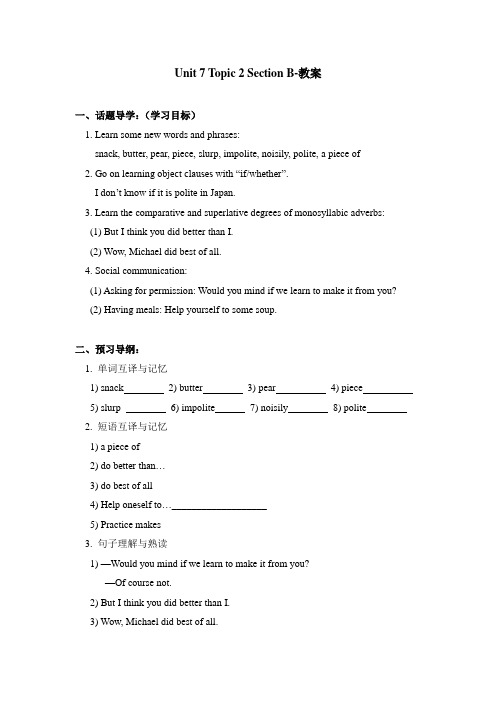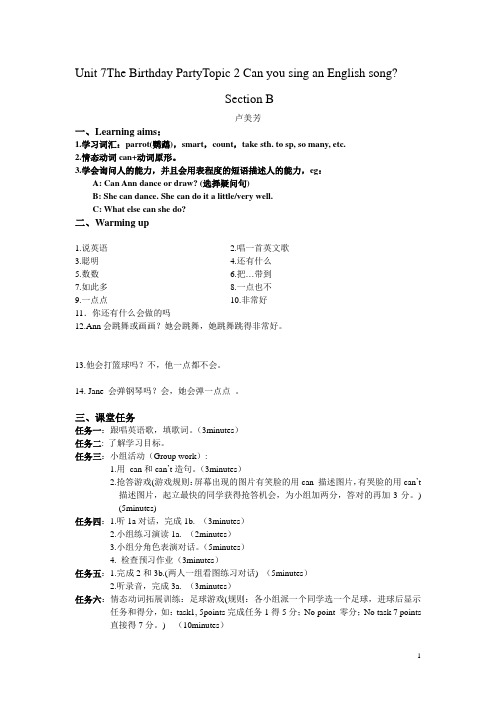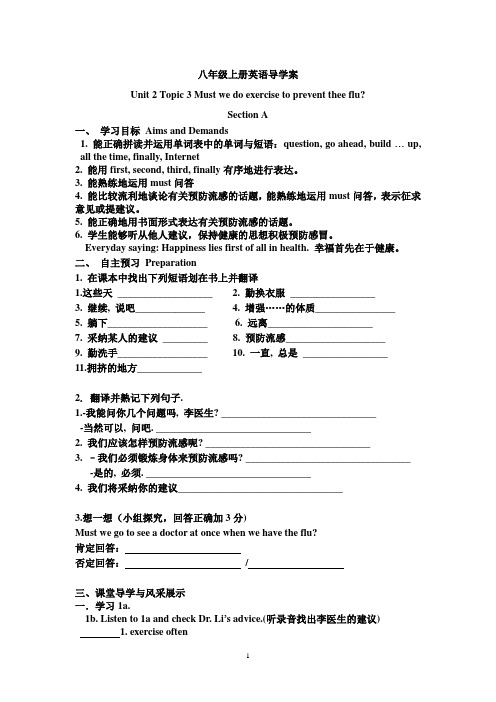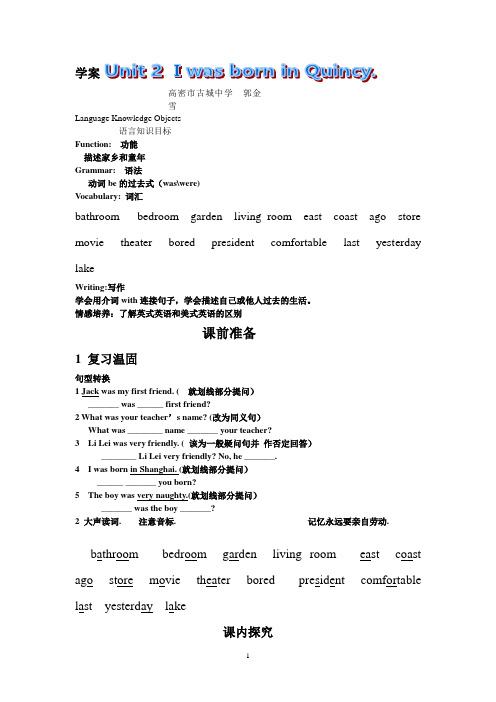七年级U7 T2 SB学案
- 格式:doc
- 大小:38.50 KB
- 文档页数:2


Unit 7 Topic 2 Section B-教案一、话题导学:(学习目标)1. Learn some new words and phrases:snack, butter, pear, piece, slurp, impolite, noisily, polite, a piece of2. Go on learning object clauses with “if/whether”.I don’t know if it is polite in Japan.3. Learn the comparative and superlative degrees of monosyllabic adverbs:(1) But I think you did better than I.(2) Wow, Michael did best of all.4. Social communication:(1) Asking for permission: Would you mind if we learn to make it from you?(2) Having meals: Help yourself to some soup.二、预习导纲:1. 单词互译与记忆1) snack 2) butter 3) pear 4) piece5) slurp 6) impolite 7) noisily 8) polite2. 短语互译与记忆1) a piece of___________________2) do better than…_________________3) do best of all____________________4) Help on eself to…_____________________5) Practice makes3. 句子理解与熟读1) —Would you mind if we learn to make it from you?—Of course not.2) But I think you did better than I.3) Wow, Michael did best of all.4) Practice makes perfect.5) I don’t know if it is polite in Japan.6) Help yourself to some soup.三、课堂导练:1. 选词填空1) I’d like the cakes with______________.It’s delicious.2) In China, People use ______________ to eat. Now, Ann can use it.3) Fred had a ______________ of bread and an egg for the breakfast.4) It’s ______________ to eat noisily in Japan5) You need to put a______________ of salt in the soup.2. 单项选择( ) 1. —How much bread do you need?—I need two ____ bread.A. pieceB. piecesC. piece ofD. pieces of ( ) 2. —would you mind if I open the window?— _____.A. Yes, I would.B. Of course not.C. Yes, please.D. All right. ( ) 3. — Do you know______ or not he will come here on time tomorrow?—Sorry, I don’t know.A. whetherB. whenC. ifD. that ( ) 4. — Who works______, Kate, Alice or Mike?—Kate works______ than Alice and Mike.A. hardest, harderB. harder, harderC. harder, hardestD. hardest, hardest( ) 5. —Would you like a ______ to eat?—No, thanks.A. pearB. butterC. forkD. pork四、复习自测:补全对话A: Hi, Jane! Le t’s make fruit salad.B: ___1____. But do you know how to make fruit salad?A: Sure. 2 .B: I like banana salad best.A: 3B: Of course not. Let’s do it together. First, cut up the bananas. Next, put them in a bowl. 4 Finally, mix(搅和)them all up.A: 5B: Thank you. Practice makes perfect.4. _______________五、课文解读:1. But I think you did better than I.但是我认为你比我做得更好。

Unit 7The Birthday PartyTopic 2 Can you sing an English song?Section B卢美芳一、Learning aims:1.学习词汇:parrot(鹦鹉),smart,count,take sth. to sp, so many, etc.2.情态动词can+动词原形。
3.学会询问人的能力,并且会用表程度的短语描述人的能力,eg:A: Can Ann dance or draw? (选择疑问句)B: She can dance. She can do it a little/very well.C: What else can she do?二、Warming up1.说英语____________________________2.唱一首英文歌____________________________3.聪明____________________________4.还有什么____________________________5.数数____________________________6.把…带到____________________________7.如此多____________________________8.一点也不____________________________9.一点点____________________________10.非常好____________________________ 11.你还有什么会做的吗________________________________________________________ 12.Ann会跳舞或画画?她会跳舞,她跳舞跳得非常好。
_______________________________________________________________________________ _______________________________________________________________________________ 13.他会打篮球吗?不,他一点都不会。

八年级上册英语导学案Unit 2 Topic 3 Must we do exercise to prevent thee flu?Section A一、学习目标Aims and Demands1. 能正确拼读并运用单词表中的单词与短语:question, go ahead, build … up, all the time, finally, Internet2. 能用first, second, third, finally有序地进行表达。
3. 能熟练地运用must问答4. 能比较流利地谈论有关预防流感的话题,能熟练地运用must问答,表示征求意见或提建议。
5. 能正确地用书面形式表达有关预防流感的话题。
6. 学生能够听从他人建议,保持健康的思想积极预防感冒。
Everyday saying: Happiness lies first of all in health. 幸福首先在于健康。
二、自主预习Preparation1. 在课本中找出下列短语划在书上并翻译1.这些天___________________2. 勤换衣服_________________3. 继续, 说吧______________4. 增强……的体质________________5. 躺下____________________6. 远离_____________________7. 采纳某人的建议_________ 8. 预防流感____________________9. 勤洗手__________________ 10. 一直, 总是_________________11.拥挤的地方_____________2. 翻译并熟记下列句子.1.-我能问你几个问题吗, 李医生? _______________________________-当然可以, 问吧. _______________________________2. 我们应该怎样预防流感呢? _________________________________3. –我们必须锻炼身体来预防流感吗? _________________________________-是的, 必须. _________________________________4. 我们将采纳你的建议_________________________________3.想一想(小组探究,回答正确加3分)Must we go to see a doctor at once when we have the flu?肯定回答:否定回答:/三、课堂导学与风采展示一.学习1a.1b. Listen to 1a and check Dr. Li’s advice.(听录音找出李医生的建议)1. exercise often2. keep the air fresh3. go to bed early4. wash hands and change clothes often5. keep our rooms clean6. drink enough water7. take some medicine8. keep away from crowded placese the correct phrases in 1b to retell Dr. Li’s advice with first, second, third and finally.(复述李医生的建议)First, ________________________________________________Second, ____________________________________________Third, _______________________________________________Finally, ______________________________________________二.学习1d.Make similar conversations after the example. (模仿例子编对话)Example:A: Must we do exercise to prevent the flu?B: Yes, we must.A: Must we take some medicine to prevent the flu?B: No, we don’t have to. / No, we needn’t.五、目标检测Practice单选( )1.-- May I ask you _______ questions? –Sure. Go on.A.someB. anyC. muchD. few.( )2. –Must we clean the classroom at once?--No, you _______. You may do it after school.A. mustn’tB. don’tC. needn’tD. don’t have.( )3.—May I take the book out of the library, Miss Li? --_________.A. You may notB. No, you mustn’tC. I’m afraid notD. No, y ou can’t.( )4. You ________ wash your hands before meals. It is good for your health.A. mayB.canC. mustD. need( )5. The doctor _______ SARS.A. is talking withB. is talking aboutC. is talking toD. is talking of( )6. Tod ay is Sunday. He ______ get up early, because he doesn’t go to school.A. doesn’t have toB. didn’t have toC. won’t have toD. have to\( )7. parents should keep their children away ________ the dangerous places.A. onB. fromC. offD.in( )8. The students should _________ after school.A. do some cleaningB. do any cleaningC. be cleaningD. cleaned ( )9. She needs to have someone looking after her ________.A. all the sameB. all the timeC. all timesD. all the times六、总结与反思。

基于“课程标准、中招视野、两类结构”七(下)Unit7 Topic1 Section B教案设计(新授课)一、学习目标确定的依据:1、课程标准相关要求:《英语课程标准》(2011年版)要求学生能够会读会写知汉意的单词和短语单词:birthday date calendar plan celebrate party fourth fifth sixth seventh eighth ninth tenth twelfth twentieth短语:1.look at2.have a birthday party3.want to do sth.4.would like to do sth.语法:1.生日和日期的问答方式2.序数词的拼读和书写3.美式和英式英语中日期的不同表达法2、教材分析:本节课为该话题的第二节课,建议用1课时上完。
在Section B 的1a,通过杰克和康康谈论生日聚会的话题,呈现主要的教学内容,主要学习谈论生日及日期的表达法,如“When is your birthday?”,“May 13 th.”, “What is the date today“It′s May 8th.””。
2a通过找出序数词的拼写规律,完成序数词的书写练习,再听录音并朗读。
2b通过匹配图文和对比了解日期的不同表达法的活动帮助学生学习美式英语和英式英语的差异。
3、中招考点:生日和日期的问答方式,序数词的拼读和书写以及日期的不同表达法是非常重要的知识点,因此需要同学们掌握并且会正确运用在实际中。
4、学情分析:本班学生英语学科基础较差,部分学生学习兴趣不是很足,而这节课所见句型十分重要,鉴于这一点,上课前应当充分备足课,知识点应让学生一点一点地归纳出来,并结合实际运用,努力提高学生的学习兴趣。
二、学习目标P57——58的生词、短语并能正确互译。
1.会读会写P572.熟读1a,能够正确询问生日和日期。
3.正确拼读书写序数词并学习序数词顺口溜。

学案Language Knowledge Objects语言知识目标Function: 功能描述家乡和童年Grammar: 语法动词b e 的过去式(was\were)Vocabulary: 词汇bathroom bedroom garden living room east coast ago store movie theater bored president comfortable last yesterday lakeWriting:写作学会用介词with 连接句子,学会描述自己或他人过去的生活。
情感培养:了解英式英语和美式英语的区别课前准备1 复习温固句型转换 1 Jack was my first friend. ( 就划线部分提问)_______ was ______ first friend?2 What was your teacher ’s name? (改为同义句)What was ________ name _______ your teacher?3 Li Lei was very friendly. ( 该为一般疑问句并 作否定回答)________ Li Lei very friendly? No, he _______.4 I was born in Shanghai. (就划线部分提问)______ _______ you born?5 The boy was very naughty.(就划线部分提问)_______ was the boy _______?2 大声读词. 注意音标. 记忆永远要亲自劳动.bathroom bedroom garden living room east coast ago store movie theater bored president comfortable last yesterday lake课内探究高密市古城中学 郭金雪1 Learning the new words.学以致用: Match these words with their meanings.bedroom garden kitchen living room movie theater pond store tree1 somewhere you relax at home_____________2 somewhere you sleep___________3 somewhere you cook ___________4 somewhere you see films ______________5 somewhere you buy things _______________6 somewhere with water for fish __________7 something you see in the forest _____________8 somewhere in front of and behind a house________2 Do activity 1,check the answers.3 Reading:A The first reading:(速读)Read and say sth. about the two people and QuincyB The second reading:(跳读)Read the passage and answer the questions:(1)Where was Betty born?(2)Who were John Adam and John Quincy Adams?(3)When was the last time Betty was in Quincy?(4)W as Betty looking forward to coming to China?C The third reading: (细读)My life in Quincy By Betty King Read and choose the correct answers.1). W ere there lots of children?A. Y es, there were.B. No, there weren’t.2). W as anyone famous born there?A. Y es.B. No.3). Who are they?A. Betty Rixon and John AdamsB. John Adams and John Quincy Adams4). W as there a garden?A. Y es, there was.B. No, there wasn’t.4. What was Betty’s house like?A. It was small.B. It was big5). How many rooms were there?A. Six.B. Seven.6). When was the last time Betty was there?A. Betty was there in 2010.B. Betty was there in 2001.4 Read and retellPassage1:was born in ,on the east coastlots of things to do…with stores, two …wasn`t boredwas very happyPassage2: two presidents…were born in Quincyvisit …old …Passage3: Our_______was big and________, There ______ a _______living room _______ a TV,a kitchen,...and three __________, On my________ ________, there were pictures_____ my ____________movie stars.Passage4: Behind the house,________ ______ a big garden________lots of trees and there ________ a small lake___________ fish_________ ________._______ _________great _____ _____ there.Passage5: There ______lots of children in Quincy, ______ _______ ________ are my friends, This was our_______ ________ in the US and I was there________last time in ________. _______ _________ I`ll_______ _______,and I`m __________ ___________ _____ seeing my friend __________.5 精讲点拨1) There were lots of things to do in Quincy.不定式to do作后置定语,修饰things.在英语中,不定式放在所修饰的词后面作后置定语,构成逻辑上的动宾关系.I have many student to teach.There were some clothes to wash.2) 构词法:英语中有classroom,bathroom,schoolbag等合成词。
Unit7 topic2 sectionB学习目标:1.继续学习情态动词can的基本用法。
2.能用情态动词can进行描述物会什么与不会什么。
学习重点:情态动词can的肯定,否定,一般疑问句,特殊疑问句的用法学习过程:1.复习检测;(1)听写单词:聪明的点数爬、攀登猪猴子2. 听录音,学习1a.3.同桌仿照1a对话练习并表演。
4.同桌仿照例子结合图片进行对话练习,完成2 。
5.听录音,独立完成36.小组活动,根据提示短语,进行描述,完成4,并记住以下习惯短语:照相画画打篮球说日语唱汉语歌做飞机模型7.听录音,学习歌曲。
达标测评:一、根据句意和首字母提示补全单词。
1. I often go s__________ in summer(夏季).2. Tom is very young, but he can c______ from one to one hundred.3. We can get eggs from h________.4. –What can a pig do? --It can w , but it can’t fly.5. Cats can c_______ trees, but tigers can’t.二、根据汉语提示完成下列句子。
1. The child can’t count ____ ____(如此多) flowers.2. I can ______ _______(照相) for you.the frog ______ ________(爬树)?4. They are making _______ ________(飞机模型).5. She often ____ _____ ______(看英语书) after school.6. My little sister is good at ______ ________(画画).7. You are so _________(灵巧的).8. Can you ________(数) from one to one hundred?9. He can do many things. So he is very ____(聪明伶俐的).10. The little boy can _______ (数) from one to one hundred?11. Fish can swim in the river, but can’t w_____ on the land.12. Cats are very good at c______ trees.三、单项选择:()1. Can you sing _____ English song?A. aB. anC. theD. /()2. I would like to sing a song ______ Kangkang.A. forB. toC. /D. at()3. I’d like to ______ some books ______ the classroom.A. take, toB. take; withC. bring; withD. bring; to()4. My brother can speak English very _______.A. goodB. betterC. niceD. well()5. Is there _______ in the classroom now?A. else anybodyB. somebody elseC. anybody elseD. else somebody()6. Can you _____ English?A. talkB. sayC. speakD. tell()7. I don’t think she can play ______ piano.A. theB. aC. anD. /()8. –Can’t you play the guitar? --__________.A. Yes, I can’tB. No, I canC. Yes, I canD. No, I’m not()9. ______ can you do?A. What otherB. What elseC. Else WhatD. Other what()10. –Happy birthday to you!--________________A. Very wellB. The same to youC. Me, tooD. Thank you。
七年级英语导学案上课时间:年月日编号: 备课组长签字:班级:小组:姓名:教师复备栏或学生笔记栏: 课题;Unit 7 SectionB (2b-2c) 课型:听说课课时: 1课时主备: 孔融复备:教师复备栏或学生笔记栏:学习目标:1、我要学会Unit7单词表中P17的重点词汇及词组。
2、我会用英语介绍物品的价格,并流利地进行交际。
3、我能在与同伴的合作中收获成功,提升自我。
Step 1 Review(复习)按要求写出学过的单词,词组及句子十一_______ 十二_________十三__________ 二十_______ 三十_________1.这些袜子多少钱?__________________________?它们十七美元。
____________________________.2.这件裙子多少钱?___________________________?它十二美元。
_______________________________.Step2.New Words and pluase(新单词,词组,句子)衣服________ 商店________ 买_______所有的______ 很________ 价格________男孩_________ 一双____________1.我们有黄色的毛衣,只售15美元。
__________________________________________________.2. 袜子2美元三双。
_______________________________________.3. 我将买下这双袜子和这件裙子。
______________________________________.Step3 Practice1.完成P41 2a . 将物品与价格配对。
2.完成P41 2c. 根据2b的广告补全对话。
3.role-play 根据2c,小组内自编对话,全员参加,进行展示。
初中七年级英语教学案课题:Unit 7 Topic 2 Section B班级:学生姓名:学习目标:继续学习情态动词can/can’t的用法,并熟练运用含有can的各种句式及相应的回答。
自学指导:预习单词和词组。
大声朗读1a课文熟悉大意。
同桌讨论并找出含有情态动词can的句子,并判断其句式。
1.翻译下列短语和句子。
①说英语_________________②祝你生日快乐_____________________③如此聪明___________________④so many balls____________⑤会爬树______________⑥别的什么__________⑦take these flowers to the party ____________⑧.弹钢琴______________⑨照相____________⑩打篮球______________⑾制作飞机模型______________⑿唱中文歌______________⒀画画_______________⒁看英文书__________________⒂说日语______________⒃唱英文歌_______________2.小组合作.听录音并做3 练习3.小组合作4练习,全班听录音5 。
知识点击1)I’d like to take these flowers to the party .我想把这些鲜花带到聚会上。
take sb. /sth . to somewhere 带某人某物去某地。
如:My mither often takes me to the zoo .2).I can’t count so many flowers .我数不清那么多的花。
①so many 意为“如此多”,后面接可数名词的复数形式。
如:There are so many buses on the road today .今天路上的公共汽车特别多。
教课资料范本博爱初中英语七年级下册精选教课设计U7T2SB编辑: __________________时间: __________________Section BⅠ. Material analysis本课是第七单元话题二的第二课时。
本节课的主要活动是1a和2。
进一步学习并稳固神态动词 can/can ’t表示个人能力的功能用语并导入新词汇smart和count。
本节课对学生的听力能力的训练方式许多,如听录音检测内容;听录音填写表格;听录音达成歌词。
不单训练学生听力理解能力和识辨图片的能力,并且培育学生听要点信息并速记的技术。
Ⅱ. Teaching aims1.Knowledge aims可以依据已学语音、音标及发音规则,正确朗诵以下词汇并运用于情形对话中:smart, count掌握 can/can ’t表示个人能力的表达法,如:(1)I can very well.(2)I can a little.(3)I can’t at all.能用英语夸奖和鼓舞别人:You are so smart!能用英语表达自我意向:I would like to take these flowers to the party.2. Skill aims可以听懂相关此刻能做和不可以做的事情的对话和简单的故事;可以听懂简单的讲堂用语并作出适合反响;可以和伙伴就能做和不可以做的事情进行口头沟通;可以用正确的语音、语调朗诵对话;可以参照图片或典范写出简单的句子。
3. Emotional aims经过学习英文歌曲,领会到学习英语的乐趣;经过小组间良性竞争与合作,培育学生之间友善相助的精神。
Ⅲ. The key points and difficult points1. Key points可以应用神态动词 can指引的 Or Questions,如:—Can Ann dance or draw?—She can dance.可以用 can/can’t表示能的相关程度,如:She can do it a little/very well.可以娴熟使用表达自我意向的表达方式。
DZCF—YY—07—030 编写时间:2014-3-04
Unit7 Topic2 SectionB学案
编写人:王洋审核人:高盼班级__________ 姓名___________
【学习目标】
1. 学习新单词和短语。
2. 继续学习情态动词can的用法。
【学习过程】
一、自学(5分钟)
自学指导:
大声朗读1a对话(至少两遍),把不懂的地方标记出来,并找出下列重点句型及短语。
当然你太聪明了!
我想把这些花带到聚会上去。
你能帮我数一下吗?
我的困惑:
二、合作探究(10分钟)
She can dance. She can do it a little/very well. 她会跳舞。
她能跳一点/很好。
a little 意为“一点儿”,表示程度“很小”;
a lot 意为“许多,非常”,表示程度“很大”;
well 在此处是副词,修饰动词
2、小组内对子根据课本2的提示,编写对话。
3、共同复习can的肯定句,否定句,一般疑问句和特殊疑问句形式,可举例说明。
三、展示质疑(15分钟)
1、小组PK,看哪个小组读课文好。
2、挑选同学展示所编写的对话。
3、挑选同学举例说明情态动词can的肯定句,否定句,一般疑问句和特殊疑问句形式。
四、点拨归纳(5分钟)
1、can的肯定句,否定句,一般疑问句和特殊疑问句形式。
2、take, bring, a little, a lot的用法。
五、当堂检测(10分钟)
1、—Jane, can you dance?
—. But I can sing Chinese songs.
A. No, I can’t.
B. No, not at all.
C. Yes, I can’t.
D. Yes, I can.
2.—Do you read in the newspaper?
—No, I don’t.
A. else anything
B. anything else
C. something else
D. else something
3. —I can play the guitar.
—can you do?
A. Something else
B. What else
C. What
D. Else
4. My uncle often me the park on weekends.
A. takes; to
B. bring; from
C. take; to
D. brings; from
5. —Can Jerry play the piano ?
—No, she can’t do it .
A. very well
B. a little
C. at all
D. a lot
6. Please the new pencil to your brother.
7. Many children in our community (会游泳) .
8. 情景交际
A:Where is Linda, do you know ?
B:She is practice(练习)dancing in the gym.
A:Wow! Can she perform ballet ?
B:Yes, but (跳得不是很好).
A:?
B:She can also sing Chinese songs.
A:Great! Jerry’s birthday is coming. I plan to have a party for him. Maybe she would like to perform at the party. ?
B:Yes, I’d love to. Thank you.
A:. What would you like to do at the party?
B:Mm, I’d like to play the guitar. What do you think of it ?
A:Good! I’m sure we’ll .
【学后思】:______________________________________________________________。